ARTICLES BEING VIEWED NOW:
- Régine Crespin
- Hector Berlioz
- Ruth Railton
- Marián Varga
- Profile. A Very Positive Conductor - Paul Bodine talks to Los Angeles Opera's Music Director Designate, Domingo Hindoyan
Greek Tragedies and Musical Theatre
GIUSEPPE PENNISI experiences two unusual performances in Syracuse, Sicily
When in the Renaissance a group of aristocrats created the 'Florentine comrades association', where opera was born, their intention was to give new life to Greek tragedy, that is, a show that included dramatic action, words, dance and music. Similarly, in designing 'the total work of art of the future', Wagner and Nietzsche thought of the Greek theatre of which, at that time, precisely because of the research of important German writers and archaeologists, important discoveries were being made. An Italian politician loves to repeat: 'Those who do not know the Greek theatre, know nothing of the human soul and have difficulty entering the political contest'. I could go on with the quotes. For example, Canadian director Robert Carsen recently recalled how fundamental Greek theatre has been and is for his staging.
This year the centenary of classical theatre performances, promoted by the National Institute for Ancient Drama (Istituto Nazionale del Dramma Antico - INDA), is celebrated. In fact, a first staging - Agamemnon by Aeschylus - took place in the spring of 1914, but World War I, first, and the Spanish flu epidemic, later, prevented the experience from continuing. The cycles resumed in 1921, in the huge theatre of Syracuse, dug into a hill overlooking the Ionian Sea (and with a capacity of 10,000 spectators), as promoted by a group of Sicilian intellectuals. The success was enormous: the King of Italy and the President of the Council went to Syracuse to attend the performances. A beautiful exhibition, curated by the Managing Director of INDA, recalls the event. In a first phase, the cycles were held every two years; then they became annual. They were always held in the Spring. For years, the practice has been to end the shows - as in Greece of 500 BC - at sunset.
Due to the pandemic, this year the performances take place in July and August. Due to climatic conditions, they start at 8pm - sunset in Sicily - and run, without intermission until 10.30-11pm. Four titles were on the billboard. I saw Nuvole (The Clouds) by Aristophanes on 15 August and Baccanti (The Bacchantes) by Euripides on 16 August 2021. On both occasions, the theatre was full to the capacity now allowed because of COVID-19 - an audience of three thousand. Even though the performances were in Italian translation of the Greek original text, a good part of the audience was non Italian; they could follow the plays due to the program notes, astute stage direction and the music.
Nuvole is, among the 'political' comedies of Aristophanes, one of the most performed even today. The creative team - Antonio Calenda, director; Bruno Buonincontri, sets and costumes; Germano Mazzochetti, music; Jacqueline Bulnès choreography - keeps the action in a stylized Attica. The connection with musical theatre of the last centuries is accentuated by the live singing - the orchestra is recorded - and by the references to operetta, satirical scores of the 1920s and the overwhelming final waltz. In short, Gilbert & Sullivan were already in Athens in 500 BC.
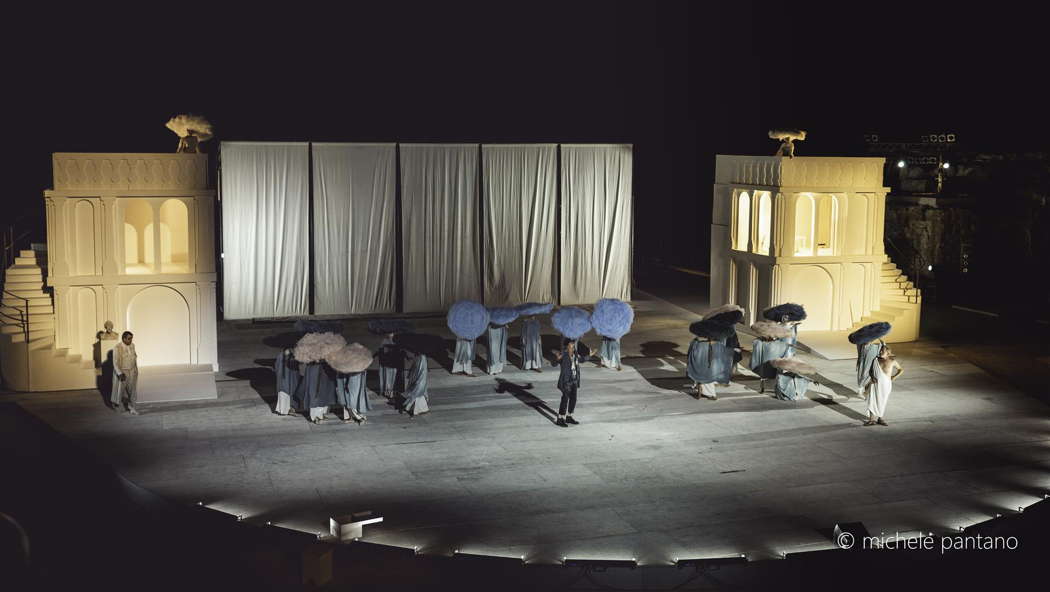
A scene from Aristophanes' Nuvole in Syracuse. Photo © 2021 Michele Pantano
The story is simple and sharp: a good man (Nando Paone) is struggling with the debts contracted by his son (Massimo Nicolini), and for this reason he turns to the most prestigious intellectual cenacle of the time led by Socrates (Antonello Fassari) for advice and help. He gets into a lot of troubles until, vilified and enraged, he sets fire to the cenacle. What about the clouds? According to the sophists of the intellectual cenacle, they would have replaced traditional religion and would be at the helm of the universe. In the dialogue and jokes, there are continuous references to the society and politics of that time. They are still relevant to today's society and politics. Aristophanes was – one might say – a 'disenchanted conservative' who looked with suspicion at the intellectual circles and innovations they proposed in the political, social and above all religious fields - such as to replace the Gods of Olympus with the Clouds. The satire was pungent then; but it still stings today.
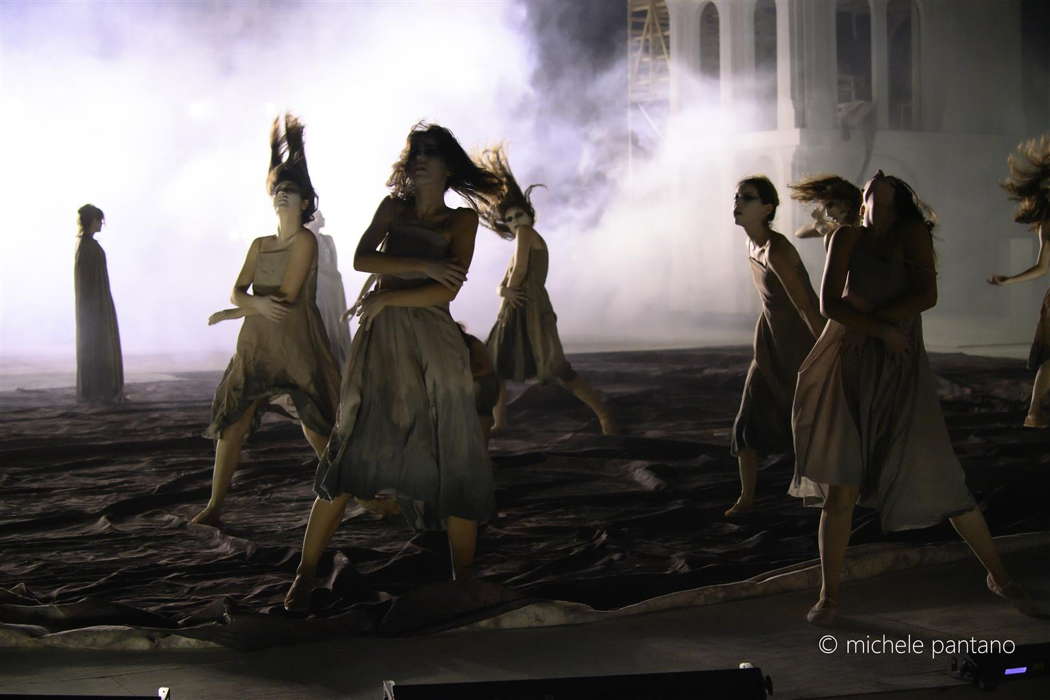
Chorus members in Nuvole. Photo © 2021 Michele Pantano
Let us now go to Baccanti (Bacchantes) by Euripides. In this magazine, on 23 June, I panned the direction of Carlus Padrissa (and the staging curated by the team of La Fura dels Bauls) on the occasion of the new production of Verdi's La forza del destino at the recent Maggio Musicale Fiorentino. His staging of Baccanti by Euripides at the Greek Theater leads me, instead, to praise him. He found the right mix in staging Euripides' most disturbing and complex tragedy. The production does not flood the viewer with projections but uses physical movements, with choruses that invade the whole theater and sing and act even suspended in the air to achieve a balance – as Guido Paduano, author of the translation of the text, acutely says – between 'religious message' and 'dramatic conflict'. The 'religious message' is ritual, to a large extent static, while the 'dramatic conflict' is inherently dynamic. Euripides merges these two components into a disturbing and gripping tragedy.
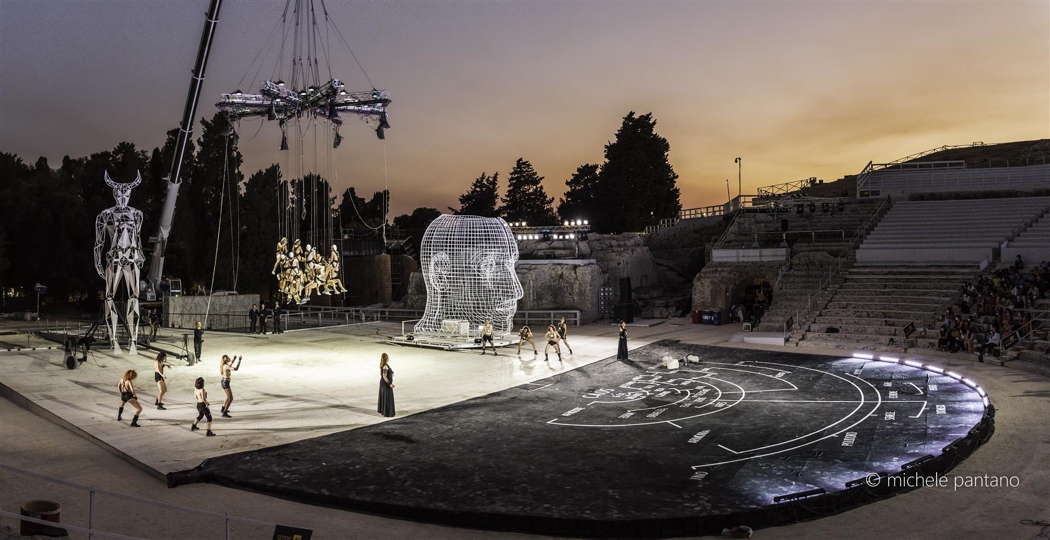
A scene from Euripides' Bacchanti in Syracuse. Photo © 2021 Michele Pantano
The plot concerns the hostility of the young and arrogant Pentheus, King of Thebes, to recognize the divinity of Dionysus, son of Jupiter and Semele, as well as the consequent punishment after a long dialogue between the God and King. When the latter accepts the divinity of Dionysus, he is not only forced to cross the city dressed as a woman but is slaughtered by the 'bacchantes', followers of Dionysus, among whom there is also his own mother, Agave. Euripides is considered among the most 'secularized' writers of ancient Greece. In this work that is one of his last, he launches a religious message, disturbing and full of pietas for humans: as indicated by the account of the death of Pentheus, and above all by the last scene of the reflection on the events between Agave and Cadmus, Pentheus' grandfather.
According to tradition, Dionysus is a bisexual God. As in a film by Igmar Bergman based on the tragedy, he is played by a woman, Lucia Lavia, who knows how to be both graceful and seductive as well as ruthless and aggressive. This can be seen above all in the long confrontational clash with Pentheus (Ivan Graziano) which constitutes the central part of the tragedy - a long dialogue in which, little by little, Penteus loses his arrogance and his strength because he is seduced by Dionysus.
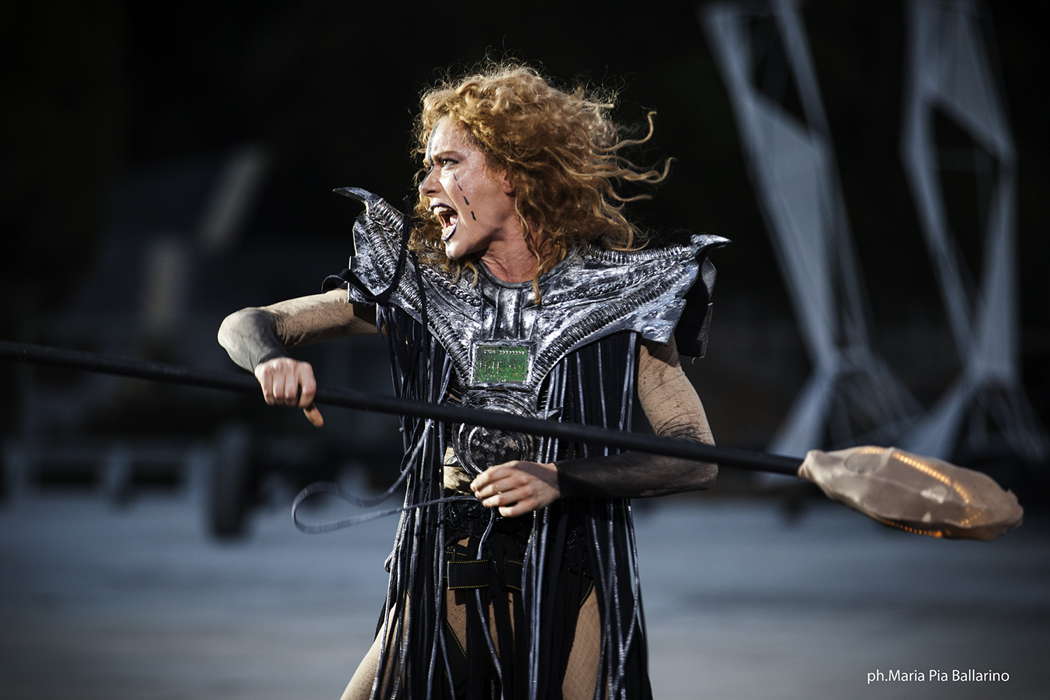
Lucia Lavia as Dionysus in Bacchanti. Photo © 2021 Maria Pia Ballarino
There are moments in which the individual characters have prominence: the ending of the tragedy between Cadmo (Stefano Santospago) and Agave (Linda Gennari). Very important are the 'messengers' (Spyros Chamilos, Francesca Piccolo, Antonio Bandiera) who, as often in Greek tragedy, have the function of narrators (in the specific case of what happens on the mountains that have become the domain of the bacchantes in the wake of Dionysus). As the title says, it is a choral tragedy, in which the focus of the religious message and the dramatic conflict is in the dialogue between Dionysus and Pentheus, but the rest of the action is entrusted to various choral groups, both of bacchantes - one of the bacchante choruses is suspended - and of Theban citizens. Padrissa and his team build a grandiose show that excites even those less interested in the philosophical - religious aspects. There is very interesting music, composed by Padrissa himself, strongly timbral, and with great use of percussion instruments, reminiscent of Uralic styles more than of Greece and the Middle East.
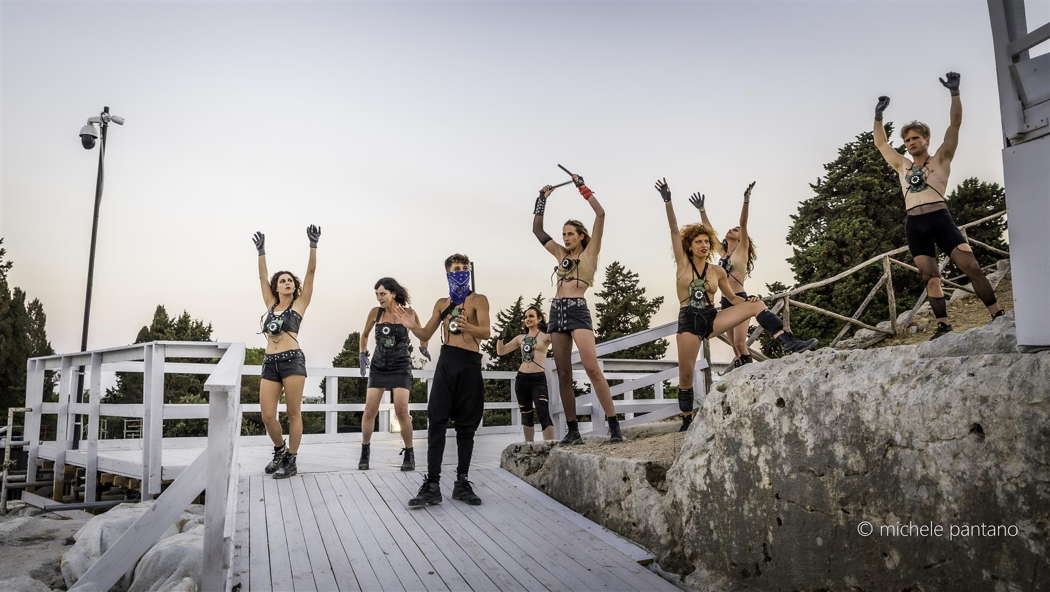
One of the choral groups from Bacchanti. Photo © 2021 Michele Pantano
Both the comedy and the tragedy were a great success.
Copyright © 23 August 2021
Giuseppe Pennisi,
Rome, Italy

CLASSICAL MUSIC ARTICLES ABOUT GREECE



